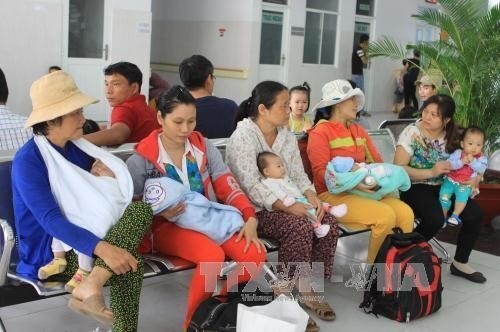The fees will fall on average from 5 percent to 24 percent compared to those issued in 2015.
Examination fees, for instance, will fall by 15 to 20 percent, or 4,800 to 5,900 VND (0.21 to 0.26 USD), at hospitals and clinics nationwide. Bed fees will be reduced by 2 to 10 percent, depending on the classification of hospitals in the country.
    |
 |
|
Children wait for health examinations at Ho Chi Minh City Paediatrics Hospital 2 |
However, bed fees for patients in intensive care departments or those undergoing organ or stem cell transplant procedures will increase slightly to 687,100 VND (30 USD) from 677,100 VND (29.60 USD) each day. Fees for seven other healthcare services will also increase.
This fee adjustment is part of the ministry’s roadmap of calculating healthcare service fees to cover expenses directly related to medical exams and treatment as well as various allowances and salaries for health workers at hospitals, Tuan said at a conference on the new circular held on July 4 in Ho Chi Minh City.
Pham Luong Son, Deputy General Director of the Vietnam Social Security, said the adjustment would help health insurance funds become more sustainable.
According to Tuan, the circular could affect hospitals’ turnover, so health facilities should take steps to save money as they are now financially autonomous.
Nguyen Nam Lien, Director of the ministry’s Department of Planning and Finance, told Vietnam News on the sidelines of the conference: “Hospitals should use their money effectively in buying medicine and medical materials and use human resources carefully.”
“It is very important that they ensure quality for health examination and treatment.”
Provincial and district-level hospitals nationwide have attracted a large number of insured patients thanks to improved quality in health examination and treatment via the ministry’s programs.
Moreover, concentrated bidding for medicine and medical materials has led to a reduction in hospital’s expenditures, he said.
For these reasons, the ministry, along with the Ministry of Finance and the Vietnam Social Security, decided to reduce fees of many healthcare services, Lien said.
Duong Tuan Duc of the Vietnam Social Security said that many hospitals would increase the number of patients examined by one doctor in order to ensure financial stability. This would result in doctors seeing patients for less time than before.
“This will be a shortcoming. The benefits of patients will be affected,” Duc said, adding that the Vietnam Social Security is suggesting that the Ministry of Health should address this issue.
As of the first six months of the year, the country’s health insurance coverage had reached 86.9 percent of the population.
Source: VNA